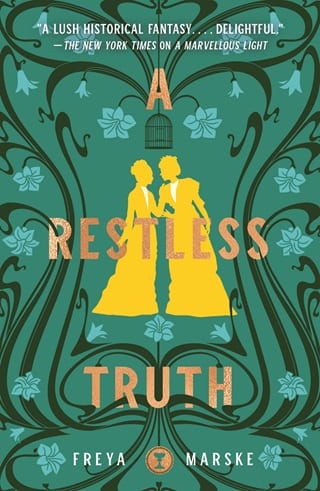Chapter 7
7
They began at the top and worked down.
Last night, Violet had barely noticed the Grand Reception’s transparent ceiling, a rounded dome of glass that pushed up into the sun deck. This morning the sky poured daylight down into the carpeted area that spread out from the top of the Grand Staircase.
The huge double doors to the dining saloon were closed now, awaiting the lunch service. Nevertheless, the Reception was busy. Corridors curled backwards from it to the A-Deck parlour suites, and two more well-trafficked exits led out to the promenades, which ran the full length of that deck.
“Aha,” said Maud with satisfaction. She tugged Violet with her to a corner of the Reception, where a clump of security officers stood near a wood-topped bar that had served cocktails the previous evening. “Excuse me?”
“Yes, ma’am. Miss. Misses.” The man who turned to Maud’s greeting looked harassed but mustered a polite smile. “I can assure you that we are doing everything we can, and if in the meantime you wish to deliver any valuables to the ship’s safe, then the master-at-arms…” He trailed off, realising that neither of them was following. “Er. Begging your pardon, was there something I could help you with?”
“You’re doing everything you can about what, exactly?” Violet asked.
The officer looked like he wished he could swallow back the last few seconds. “A few of the passengers have reported that they returned from dinner last night to find valuables missing from their rooms.”
Maud went still. Violet pressed a showy hand to her own chest and gasped, “Valuables?”
“Jewels,” he admitted.
Violet was ready to perform some minor anxious hysterics, but it wasn’t necessary. Maud widened her eyes and leapt into a plaintive, fussy interrogation of the officer (“Ferris, miss”) about whether the lower-class passengers had the run of the ship, and how she was supposed to sleep when there could be ruffians stalking the corridors in the night .
Ferris looked taken aback when Maud pulled out the map and a pencil, but he pointed out all the firm barriers on B, C, and D Decks that separated the second- and third-class areas from the first-class cabins and amenities. No, holders of lesser tickets could not pass through those hatches or access these elevators. Yes, they had security officers posted there as needed.
Violet couldn’t resist another gasp. “Does that mean you are looking for the culprit among the first-class passengers? A gentleman thief?”
Ferris hesitated, visibly torn between casting aspersions on the quality of first-class passengers and admitting to possible flaws in security.
“If you’re curious about these areas, miss”—indicating the blank spaces on Maud’s map—“there’s a framed blueprint in the library. It may be more technical than you care for, but…”
But please leave me alone now, dangled unsaid.
“Oh, thank you,” Maud said, with a final deployment of dimples.
Violet’s gloved palm floated on the gleaming wooden banister as they descended the staircase. “Maud. If there’s a real thief aboard, could they have stolen Mrs. Navenby’s silver? What if they simply surprised her? Old women’s hearts can just stop, you know.”
“A thief would have taken more of the real valuables. No. Her death was about the contract. I’m sure of it.”
“In that case…” Violet hesitated to burst Maud’s investigatory bubble further, but it had to be said. “Any moderately creative magician can slip into an unmagical place where they aren’t allowed. I doubt there’s any sort of warding here.”
“Yes.” Maud frowned. “We can’t narrow the suspects to first class yet. So it’s even more important for us to know every part of the ship.”
Violet bit her tongue on wondering if traffic was allowed in the widdershins direction. She had a rapidly enlarging confidence in Maud’s ability to charm her way past obstacles.
As well as the Café Marseille, the fore half of B Deck held the bulk of the first-class cabins, and the first-class library and smoking lounge. The single occupant of the library was a man with a prodigious grey moustache snoring in an armchair, newspaper draped over his chest, the tidal swell of his belly straining against his braces. The room smelled of leather and wood polish.
Maud ignored the shelves of books and located the blueprint of the Lyric, hung on the wall. The amount of detail made Violet squint, but Maud gamely covered her pamphlet in notes and subdivisions and scribbles.
The second-class staircase, quite aft, went between B and D Decks only. Ferris had assured them that third-class passengers were largely confined to the cabins and social areas on D Deck, though they could take a direct elevator to B Deck to access the main promenade there.
“I saw this yesterday,” Maud said, tapping a small square. “The Grand Staircase stops in the foyer on C Deck. So there’s this small staircase from the foyer down to D and E, to give access to the squash court and the Turkish baths. It looks like it might go all the way to the cargo hold! Shall we find out?”
The Grand Foyer was even busier and more opulent than the Reception. Crystal dripped around electric lights in the enormous chandelier, and every surface was polished to a glossy shine. The grandeur of it all felt like a theatre, just as the good new clothes Violet wore felt like a costume. And she was enjoying today’s role. It was always fun to match the energy of a generous partner.
The first-class elevators were full of people equipped with parasols and shawls and boaters, clearly on their way up to the sun deck. Maud and Violet took the narrow doorway in the corner of the foyer and proceeded down a staircase that was serviceable rather than opulent. The first landing on D Deck had a sign pointing the way to the squash court—if Violet strained her hearing, she could faintly hear the solid thwacks and breathless calls. The engines were louder down here.
Another sign announced that the entrance fee to the Turkish baths was two shillings—“I’m afraid ladies’ hour has already passed for today,” the hovering attendant said when Maud and Violet approached. “You’re welcome to come back tomorrow.”
The glass panes in the doors were clouded with steam and etched with a stylised white pattern. One door swung open, emitting a young man with damp hair wearing only a thin undershirt with his trousers. His already pink face pinkened further when he saw Maud and Violet, and he stopped in the doorway to scramble into the sweater he held.
Violet took advantage of this to peer shamelessly around him. Fronds of ferns and walls tiled in turquoise blue were visible through the steam beyond. Like a gasping beast, the baths had emitted a puff of damp, fragrant air into the space where they stood. The sweet, deep scent caught at a memory for Violet. Before she could chase it down and match it to a place or time, the door closed and the scent faded.
The staircase they’d taken did continue downwards, narrower and dimmer. Two men with dirty coveralls and soft caps, which they touched absently when Violet glanced over, came up through the stairwell flipping through a sheaf of paper and conversing in low voices. Maud’s best wide-eyed curiosity was met, this time, with a firmly courteous no at the prospect of peeking into the cargo hold.
“What next?” Violet asked as they ascended to the foyer. So far this exploration had produced a great deal of ship and noth ing in the way of clues. She didn’t much care—she was more than adequately entertained—but Maud was looking deflated.
“I said last night you’ll be able to help me break into cabins to look for Mrs. Navenby’s silver. Will you? Can you?”
“Let’s find out,” said Violet cheerfully.
They began with Violet’s own stateroom on B Deck. Violet had an opening-spell in her repertoire but discovered quickly that it didn’t take well to the slippery keyholes of the cabin doors. Or perhaps she was remembering the cradles wrong.
Maud pretended to adjust Violet’s hatpins in case someone walked past, and Violet moved her fingers through the remembered motions. The spell was like a puff of mist. It kept fizzling to nothing when Violet tried to coax it against the keyhole of the nearest door. Which of her rings would help here? Perhaps the leather—
“I say,” said Maud, “these flowers aren’t real. My fingers go right through them.”
“The violets? No, they’re illusion.”
“And you’ve held it this long? Doesn’t that take a lot of concentration?”
“The spell’s anchored to the straw. I put in enough magic to hold it for a day, I thought. Are they fading?” She let the unsuccessful cradle drop and looked at Maud. For the first time it occurred to her to ask: “Maud, how many magicians do you actually know? Is it just Edwin Courcey?”
“More or less,” said Maud. “Oh, and Kitty Kaur, but I haven’t seen as much of her since she—” A subtle gesture to her midsection. “Edwin says illusion needs a visual imagination, and that you have to keep your focus, to sustain it.”
“For something large or complex, yes. But there are shortcuts. Ways to self-sustain. Most of the magic of the Penumbra was illusion.”
“Edwin’s going to love you. I hope you’re prepared to be sat down and treated like an encyclopaedia. He was so excited that I was going to America. He wanted me to take notes. He would have gone himself, but he and Robin are—watched.”
Violet skipped directly over the assumption that she would ever come face-to-face with the other members of Maud’s little conspiracy, and returned her focus to the opening-spell. She breathed smoothly and held each intermediate form of the cradle in a way that Claudette would have laughed at, and this time the mist was thicker and slid gracefully onto the lock.
It clicked.
“There.” Violet opened the door a demonstrative crack, then closed it. “I’ll have to practice that one. I—”
She was interrupted by a high, weird drone of sound. It coughed into nothing. Then came again. It had the echo of distance but was quite distinct.
“What is that ?” Maud was already moving in the direction of the noise. They followed it aft, past knots of people also craning to discover the source, and came out on a smaller deck. As they stepped into the open air, the noise battered exuberantly at the ears. Shrill wails, punctuated by drums, stopped and started in bursts. Several young men in military dress, including kilts, were forming themselves into lines for rehearsal. Half of them carried bagpipes tucked under their arms like unruly children.
With some shouting, Violet managed to establish from an elderly gentleman nearby that this was the Pipes and Drums of the London Scottish Regiment, who had been to America to perform a demonstration and were now returning home.
The nearest piper paused in his red-faced puffing to send a shy grin in Maud’s direction. The noise was sounding closer to music now. Violet could feel the crisp rattle of the drums in her breastbone. It was awful and glorious at the same time.
“Oh, drat, ” said Maud suddenly. She turned to half yell in Violet’s ear. “The parrot! Mrs. Navenby told me as soon as we were aboard to send to the kitchens for Dorian’s feed, but it kept slipping my mind, what with—well, everything!”
Maud located a steward and asked the way to the kitchens. She required, she said, to beg some fruit and nuts for her employer’s parrot.
“I’m sure I can arrange for whatever you need,” the steward said, in tones that meant the young ladies would be very much in the way.
“How kind, ” said Maud. “But it’s such a tedious list of things that he will and won’t eat. Just point us in the right direction, and I’ll speak to the cooks myself.”
The steward hesitated, but Maud had gathered around herself the impervious confidence of someone who wasn’t used to being refused and was going to be obstinately unable to comprehend anything that sounded like refusal. Violet wasn’t surprised when the steward gave up and escorted them to the first-class galley. The supervising chef reacted with startling irritation to Maud’s request.
“I give up!” he snapped. “First I am told to provide for monkeys, and tigers, and the good Lord only knows what else! Now I am to also feed birds that do not appear on the list!”
Feelings thus expressed, the man stalked off to the other side of the hot, noisy space. An aproned woman took his place and, once the situation was explained, put together a basket of discarded nuts and bits of fruit that were on the turn.
“I do appreciate it,” Maud said. “Might I know your name? Have you been with the White Star Line long? And before that—oh, in Piccadilly? I’ve not been there myself, but I know the name—”
Violet’s aunt was of that category of women who considered it a sign of poor breeding to pay much attention to the help, beyond making sure they weren’t shirking or stealing. It no longer surprised Violet that Maud, for all she was a baronet’s daughter, was alive to how much the unseen class of people might see, and hear, and be able to tell you. Maud quickly extracted from the bemused woman some details about conditions in the Lyric ’s staff quarters, and the existence of staff hatches and corridors to allow for easy movement through the ship.
Apparently Maud’s mention of the Strand ’s detective fiction had been apt. Violet considered the narrator of those Sherlock Holmes stories: a man dragged into following his chaotic genius of a roommate, first out of boredom and then appreciation.
She could sympathise.
“I should feed Dorian directly,” Maud said as they left. “When he’s hungry he makes noises like those bagpipes, truly—it’s why I remembered him in the first place.”
“Perhaps you should donate him to the regiment as a mascot.”
“Monkeys and tigers,” said Maud. “I wonder what he meant?”
“Monkeys—? Oh. Mr. Bernard’s menagerie, I expect.”
“Menagerie?”
Violet opened her mouth with an explanation, and an idea slid into her mind.
“Now, that might be a way for you to see the cargo bay,” she said. “Come along, Maud, my dear, and bring your basket. I’m going to introduce you to some Americans.”
 Fullepub
Fullepub 



